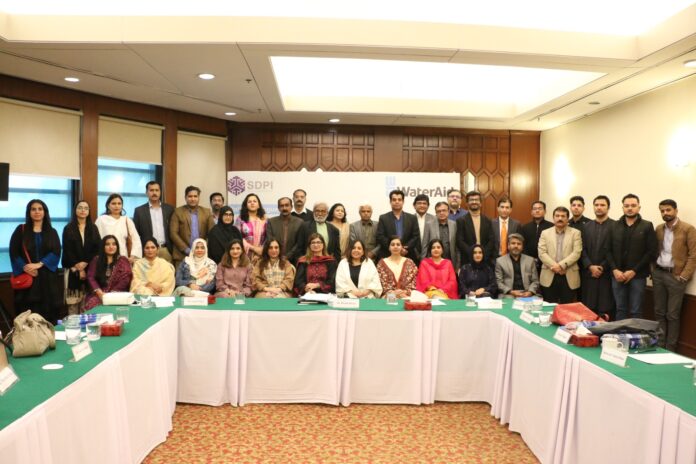- Advertisement -
ISLAMABAD, Jan 21 (APP):Experts call upon the private sector to act on Water, Sanitation, and Hygiene (WASH), which together is a key component of achieving sustainable development and a fundamental aspect of the global sustainable development goals.
Speaking at a policy dialogue organized by WaterAid Pakistan in partnership collaboration with the Sustainable Development Policy (SDPI), they suggested removing lacunas in the existing policies and encouraging private sector
to harness the full potential of utilizing Public-Private Partnerships for WASH, said a press release issued here on Tuesday.
The event brought together experts, policymakers, and practitioners from the Water, Sanitation, and Hygiene (WASH) sector to provide policymakers and policy influencers with evidence to make informed decisions about the public-private partnership (PPP) in the WASH sector.
The situation in Pakistan has revealed that the WASH sector faces serious constraints amid climate change, population growth, and urbanization. The public sector has played a major role in promotion of WASH, but recently the private sector has complemented the efforts of the former. However, their contributions are somewhat limited due to regulatory hurdles, lack of coordination, and alignment with public sector programs and strategies.
Awais Umar emphasized the importance of establishing appropriate and targeted policies and standards for water quality, sanitation, and hygiene to meet WASH benchmarks in the private sector. The WASH policies and plans should prioritize monitoring and evaluation, staff training and awareness, and information sharing among stakeholders. He highlighted the necessity of ensuring quality and sustainable WASH services as Pakistan works towards achieving the objectives of the Sustainable Development Goals.
Muhammad Khaliq, provincial manager WaterAid for Sindh and Balochistan, highlighted the organization’s decentralized approach, which aligns its 2023 country strategy with Pakistan’s devolved governance framework. Provincial offices in Lahore and Karachi now oversee operations in Punjab, KP, Sindh, and Balochistan.
“Our five-year strategy treats WASH as a crosscutting issue intertwined with climate change,” Khaliq stated, adding that WaterAid’s efforts include dignified access to women’s hygiene management, clean drinking water, and sanitation initiatives. Stressing the significance of private sector partnerships, he remarked, “Without private sector support, bridging the demand-supply gap in WASH is impossible.”
Dr. Bisma Imran, Health and WASH specialist Expert at WaterAid, emphasized the need for the private sector to share its practices and evidence with academia. “Credible research and evidence are essential for informed decision-making,” she noted.
Dr. Surraya Jabeen from the University of Karachi urged universities to undertake WASH-focused research projects to uncover cost-effective solutions. She stressed sustainability in private sector contributions, stating, “CSR activities without long-term financial and environmental considerations cannot yield lasting results.”
Dr. Kamaran Somroo, Principal Scientist at PARC, called for sustainable, low-cost technologies to cater to Pakistan’s vast population of 230 million. “Behavioural change is key to enhancing ownership and effective implementation of WASH initiatives,” he added.
Abdullah from the Laar Humanitarian and Development Programme criticized the lack of prioritization of WASH in private sector CSR initiatives, calling for a dedicated focus. Similarly, Dr. Naveed Bhutto, Nutrition Advisor for the Government of Sindh, urged a united effort from the private sector, academia, civil society, and government to tackle WASH challenges.
Private sector representatives proposed exploring water credits, akin to carbon credits, to incentivize sustainable water use. Enhanced advocacy and mass awareness campaigns were identified as crucial to driving behavioural change and fostering community ownership of WASH initiatives.
The dialogue participants concluded with a consensus on the need for multi-stakeholder collaboration, evidence-based policymaking, and innovative solutions to secure sustainable access to WASH services in Pakistan.

